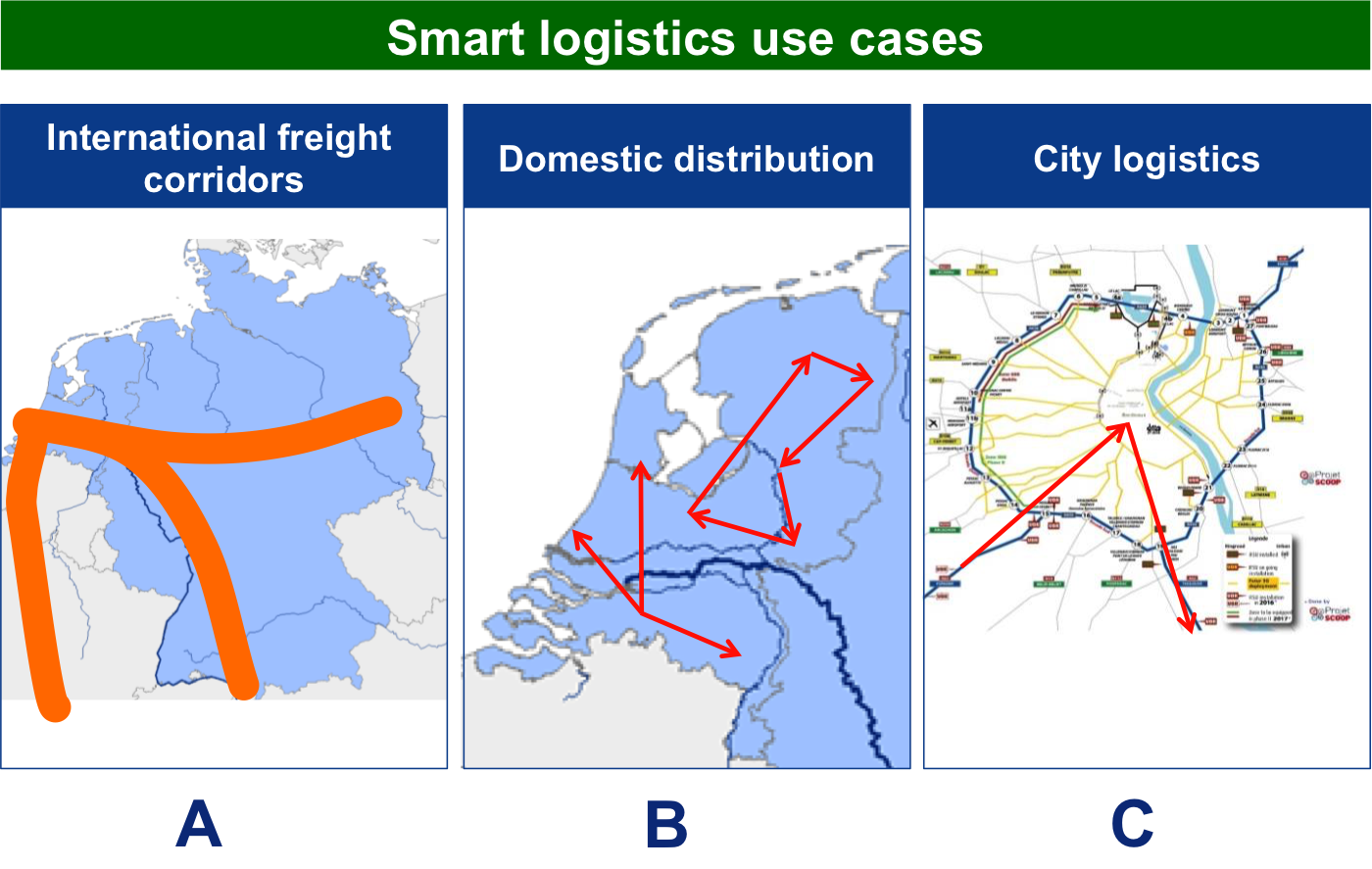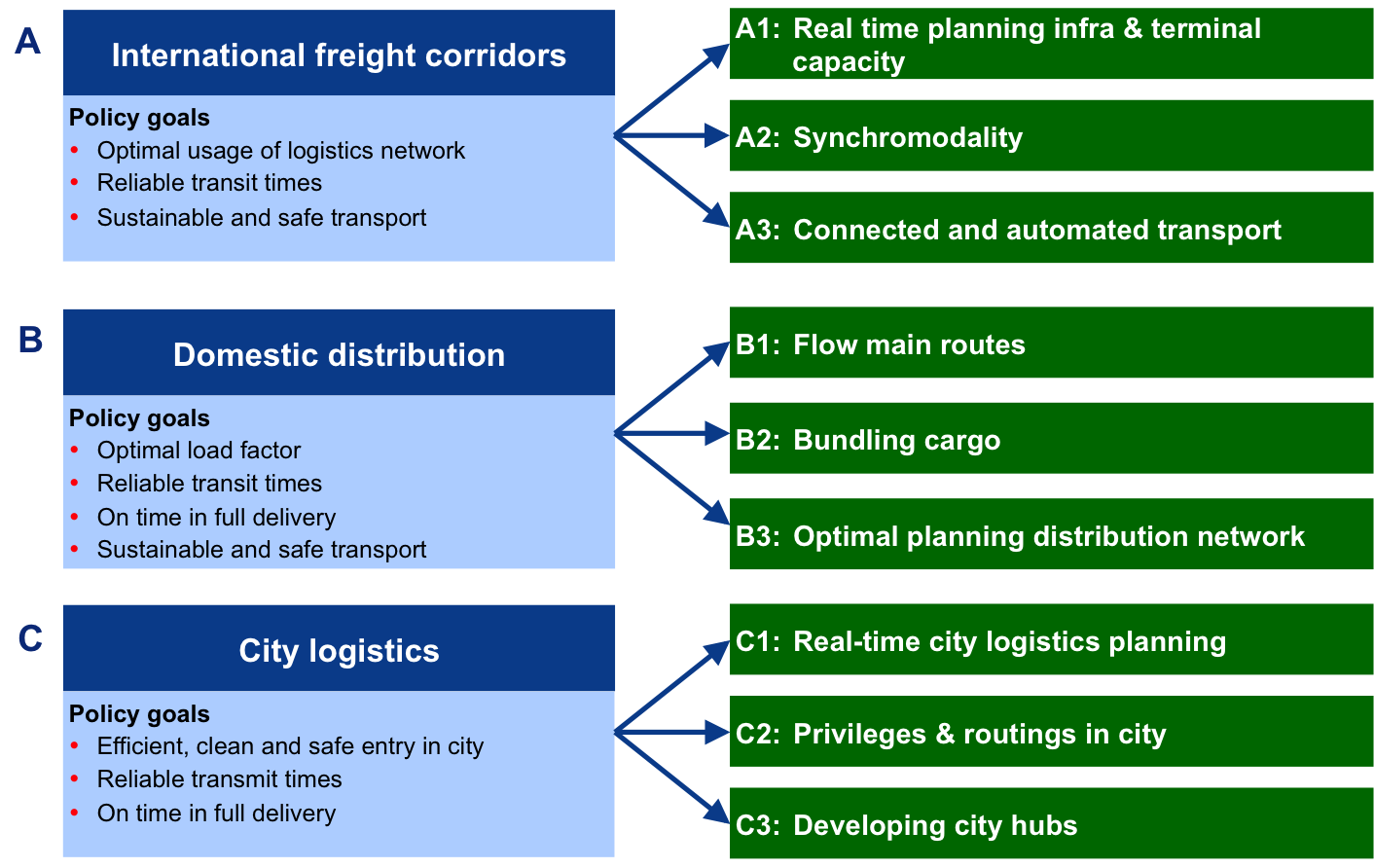Smart logistics is a key solution to cope with the challenges in city distribution. Smart Logistics can be defined as the combination of traffic management structuring and navigating traffic for optimal use of traffic system and logistics management (organizing, planning, control and execution of the flow goods) by effective usage of data.
Smart logistics offers public authorities opportunities to improve dynamic traffic management and to improve enforcement (if needed) of local rules, for example in terms of accessibility of a city center (time of day, location and type of vehicle). Next to that, the applications of smart logistics offer business opportunities to logistics companies and their clients. Smart logistics solutions improve efficient transport and warehousing, but they also facilitate the (inter)connectivity between different logistics networks, for example for the exchange of transport orders between different parties and/or modalities.
The concept of smart logistics is today mainly applied within the area of inner city distribution. Improving inner city distribution structures is an important topic for the vast majority of European cities. It is also a challenging topic due to the sometimes contradictory interests of inhabitants on the one side and entrepreneurs on the other side. City distribution concerns accessibility and efficient transport within the cities, but it also effects healthy living and air quality. Therefore, the need for defining and implementing smart solutions for city distribution increases, from both an organizational and technological perspective.
City councils tighten accessibility regulations for freight vehicles related to emission levels. Comprehensive measures were taken in London, Berlin, Dublin and many other cities of Europe. The city of Amsterdam expressed for example the ambition for zero-emission city distribution in 2025. This means that 95% of the current commercial vehicles are being banned from the inner city of Amsterdam. Other metropolitan areas in Europe are taking measures to improve air quality and CO2 reduction as well. Cities are also broadening their scope from freight vehicles to other means of (private and public) transport. The societal movements and interests in cleaner transport within the city boundaries have far-reaching consequences for the logistics sector. These challenges can be addressed with new methods and concepts to organize city distribution in a more sustainable way.
In a world of fast evolving innovations and complex challenges for public authorities there is an increasing need for a governance model which is based on equal public-private decision making processes, especially when developing and implementing innovative smart logistics solutions. In the past public (road) authorities developed their own transport solutions, with perhaps too little attention for the business needs. Currently, market parties are able to develop better suited solutions in a more cost-efficient way. This means public authorities can co-develop these solutions together with companies instead of a mainly ‘in house’ development.
The most important transition routes are:
There are a lot of promising innovations in the field of smart logistics. For example, truck platooning and Logistics As A Service. Often the technology is already available, but the challenge is to realize viable business models based on co-operation along the value chain. Equal sharing costs and benefits models remain a hot topic. Integrating public and private open source data is a second promising development. The exchange of traffic and logistics trip data between companies and road authorities enables both parties to improve their operations. Smart logistics solutions also create new connections between IT specialists and logistics service providers. New, IT oriented companies enter the market of LSP’s and can both act as a competitor or working together with them. Examples of the latter are IT tools that enable LSP’s to collaborate on bundling freight.
BCI provides consulting services for efficient and sustainable city distribution such as market research, quick scans, implementation services and support of policy makers.
An important question is how the opportunities that Smart Logistics provide can be successfully implemented in regional or local public action programs as well as in business opportunities for private companies. Involvement of logistics service providers and shippers is a vital success element in many projects within this field. Combining logistic innovations with business perspectives asks for clear insights in the latest developments and the level playing field. BCI has extensive knowledge of Smart Logistics and has been involved in several international networks and projects regarding both Smart Mobility and Logistics. BCI understands and knows how to operate at the crossroads of public policies, implementation and businesses and can make this combination successful.
On Smart Logistics BCI can assist with:
BCI distinguishes three geographical levels for developing a (regional) smart logistics strategy: (A) smart logistics along international freight corridors, (B) domestic distribution and (C) city logistics.
Three perspectives to develop smart logistics strategy

At each geographical level BCI uses building blocks to develop a (regional) smart logistics policy. These possible measures can be implemented and matched with the regional ambition.
Possible measures for smart logistics
